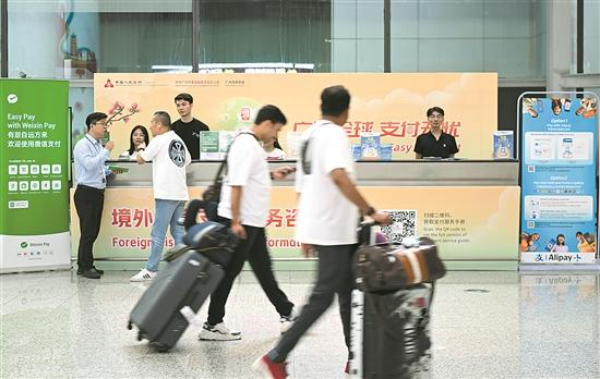The 135th Canton Fair is about to open, attracting a large number of overseas exhibitors and buyers to Guangzhou. Ye Mao, deputy director of the Business Management Department of the Guangdong Branch of the People's Bank of China, stated that the People's Bank of China, as the leading unit, has coordinated with local financial management, commerce, tourism, transportation, and other departments to identify 17 key areas with significant international exposure in Guangzhou. These areas include large shopping districts, tourist attractions, resorts, cultural and museum venues, entertainment venues, hotel accommodations, and transportation hubs, involving 14,000 key merchants. Point of sale (POS) terminals in these areas have been upgraded to accept mainstream overseas bank cards.

As of April 8th, the acceptance rate of overseas bank cards at key merchants in Guangzhou has reached nearly 80%. In March, the number of transactions made with overseas bank cards in Guangzhou reached 126,000, with a total amount of 170 million yuan. "We are confident that the acceptance rate of overseas bank cards in key areas will reach 90% before the Canton Fair," Ye Mao said.
Regarding foreign currency exchange and cash usage, the Guangdong Branch of the People's Bank of China has focused on entry ports and organized banks to reasonably increase the RMB cash exchange facilities. As of the end of March, there were 5,615 ATMs in Guangzhou, and the number of ATMs supporting cash withdrawals with overseas bank cards reached 5,526, with a coverage rate of 98%. There are also 43 foreign currency exchange points and 31 self-service exchange machines. Additionally, more than 10 million yuan changes have been distributed to business operators such as taxi drivers.
Currently, the penetration rate of mobile payments in China has reached 86%. Ye Mao suggested that if international guests are willing to try mobile payments, they can do so through two methods: "binding overseas bank cards to China's mobile payment system" and "using overseas e-wallets for transactions within China"."Binding overseas bank cards to China's mobile payment system" means linking overseas bank cards to Alipay or WeChat for mobile payments. However, this leads to issues like identity verification and payment limits. In response, the Guangdong Branch of the People's Bank of China has introduced a series of targeted solutions. For example, transactions below a certain amount are exempt from collecting identity information; the payment limit for mobile payments by inbound passengers has been increased to $5,000 per transaction and $50,000 per year.
"Using overseas e-wallets for transactions within China" means that foreigners can directly use overseas electronic wallets to pay Chinese merchants. Currently, WeChat Pay Hong Kong can be linked to a "Yang Cheng Tong card" for transportation by Hong Kong and Macao compatriots. Electronic wallets from 13 countries and regions, including Singapore, Malaysia, Thailand, the Republic of Korea, and Mongolia, can also be used for payments within China.
As of the end of March, 457,000 merchants in Guangzhoucanaccept "binding overseas bank cards to China's mobile payment system" and "using overseas e-wallets for transactions within China".These merchants have served over 818,000 foreigners, facilitating a total of 3.125 million transactions, with a combined value of 420 million yuan.

